Optimal Decisions in an Authorized Remanufacturing Closed-Loop Supply Chain under Dual-Fairness Concerns
Abstract
1. Introduction
- (1)
- How do the third party’s distributional fairness concerns and peer-induced fairness concerns influence optimal decisions of the authorized remanufacturing CLSC enterprises under the retailer’s different attitudes towards the third party’s fairness concerns?
- (2)
- How do the authorized remanufacturing CLSC members’ profits and environmental impact change with third party’s dual-fairness concerns? How should the retailer choose its attitude towards the dual-fairness concerns of the third party to maximize profit?
2. Literature Review
2.1. Authorization in Remanufacturing
2.2. Fairness Concerns in Supply Chain
3. Problem Description and Formulation
- 1.
- The market capacity is . Consumers’ willingness-to-pay (WTP) for a new product is , which follows the uniform distribution in the interval . Consumers’ WTP for a remanufactured product is , where is the consumers’ acceptance of the remanufactured product relative to the new product. Consumers’ utility from purchasing new and remanufactured products are and , respectively. If and , the consumers will buy new products; if and , the consumers will buy remanufactured products. The demand functions for the new and remanufactured products can be derived as follows [9,42]:
- 2.
- 3.
- 4.
- 5.
- Referring to Xia et al. [21], we consider environmental impacts of product production and product disposal. The unit environmental impacts during the production of new and remanufactured products are and respectively. The environmental impact of unit unreturned product disposed is . And . The overall environmental impact is expressed as
4. Model Solution
4.1. The Retailer Considers the Third Party’s Dual-Fairness Concerns (Model F)
4.2. The Retailer Does Not Consider the Third Party’s Both Types of Fairness Concerns (Model N)
4.3. The Retailer Only Considers the Third Party’s Distributional Fairness Concerns (Model D)
4.4. The Retailer Only Considers the Third-Party’s Peer-Induced Fairness Concerns (Model P)
5. Numerical Analysis
6. Conclusions
Author Contributions
Funding
Institutional Review Board Statement
Informed Consent Statement
Data Availability Statement
Acknowledgments
Conflicts of Interest
References
- Jiang, X.; Zheng, Y. Pricing decisions and remanufacturing strategies considering consumer recycling behavior. Ann. Oper. Res. 2023, 322, 755–792. [Google Scholar] [CrossRef]
- Li, Z.; Zheng, W.; Meng, Q.; Jin, S. The impact of government subsidy and tax policy on the competitive decision-making of remanufacturing supply chains. Int. J. Sustain. Eng. 2019, 12, 18–29. [Google Scholar] [CrossRef]
- Ma, P.; Li, M. Operational and financing decisions of original equipment manufacturers under third-party remanufacturing modes. Comput. Ind. Eng. 2023, 183, 109508. [Google Scholar] [CrossRef]
- Huang, Y.; Wang, Z. Information sharing in a closed-loop supply chain with technology licensing. Int. J. Prod. Econ. 2017, 191, 113–127. [Google Scholar] [CrossRef]
- Wu, X.; Zhou, Y. Buyer-specific versus uniform pricing in a closed-loop supply chain with third-party remanufacturing. Eur. J. Oper. Res. 2019, 273, 548–560. [Google Scholar] [CrossRef]
- Zhou, Q.; Meng, C.; Yuen, K.F. The impact of secondary market competition on refurbishing authorization strategies. Int. J. Prod. Econ. 2020, 228, 107728. [Google Scholar] [CrossRef]
- Zhang, Y.; Chen, W.; Li, Q. Third-party remanufacturing mode selection for a capital-constrained closed-loop supply chain under financing portfolio. Comput. Ind. Eng. 2021, 157, 107315. [Google Scholar] [CrossRef]
- Wang, N.; He, Q.; Jiang, B. Hybrid closed-loop supply chains with competition in recycling and product markets. Int. J. Prod. Econ. 2019, 217, 246–258. [Google Scholar] [CrossRef]
- Zou, Z.-B.; Wang, J.-J.; Deng, G.-S.; Chen, H. Third-party remanufacturing mode selection: Outsourcing or authorization? Transp. Res. Part E-Logist. Transp. Rev. 2016, 87, 1–19. [Google Scholar] [CrossRef]
- Agrawal, V.V.; Atasu, A.; Van Ittersum, K. Remanufacturing, third-party competition, and consumers’ perceived value of new products. Manag. Sci. 2015, 61, 60–72. [Google Scholar] [CrossRef]
- Li, X.; Cui, X.; Li, Y.; Xu, D.; Xu, F. Optimisation of reverse supply chain with used-product collection effort under collector’s fairness concerns. Int. J. Prod. Res. 2021, 59, 652–663. [Google Scholar] [CrossRef]
- Qu, S.; Shu, L.; Yao, J. Optimal pricing and service level in supply chain considering misreport behavior and fairness concern. Comput. Ind. Eng. 2022, 174, 108759. [Google Scholar] [CrossRef]
- Liu, Z.; Wan, M.D.; Zheng, X.X.; Koh, S.L. Fairness concerns and extended producer responsibility transmission in a circular supply chain. Ind. Mark. Manag. 2022, 102, 216–228. [Google Scholar] [CrossRef]
- Oppo, Vivo Face Backlash from Retailers over Cut in Margins. Available online: https://www.moneycontrol.com/news/business/oppo-vivo-face-backlash-from-retailers-over-margin-cut-2478483.html (accessed on 17 August 2024).
- The Story of Intel, Apple, and Qualcomm: The Apple and Qualcomm Lawsuit. Available online: https://www.inquartik.com/blog/case-intel-apple-qualcomm/ (accessed on 17 August 2024).
- Liu, W.; Wang, D.; Shen, X.; Yan, X.; Wei, W. The impacts of distributional and peer-induced fairness concerns on the decision-making of order allocation in logistics service supply chain. Transp. Res. Part E-Logist. Transp. Rev. 2018, 116, 102–122. [Google Scholar] [CrossRef]
- Pan, K.; Cui, Z.; Xing, A.; Lu, Q. Impact of fairness concern on retailer-dominated supply chain. Comput. Ind. Eng. 2020, 139, 106209. [Google Scholar] [CrossRef]
- Zhong, Y.; Sun, H. Game theoretic analysis of prices and low-carbon strategy considering dual-fairness concerns and different competitive behaviours. Comput. Ind. Eng. 2022, 169, 108195. [Google Scholar] [CrossRef]
- Nie, T.; Du, S. Dual-fairness supply chain with quantity discount contracts. Eur. J. Oper. Res. 2017, 258, 491–500. [Google Scholar] [CrossRef]
- Cao, X.; Wen, H.; Zhang, C. Pricing decisions of two-echelon remanufacturing supply chain with remanufacturer’s fairness concerns. J. Remanuf. 2022, 12, 253–280. [Google Scholar] [CrossRef]
- Xia, X.; Chen, W.; Liu, B. Optimal production decision and financing strategy for a capital-constrained closed loop supply chain under fairness concern. J. Clean Prod. 2022, 376, 134256. [Google Scholar] [CrossRef]
- Li, C.-F.; Guo, X.-Q.; Du, D.-L. Pricing Decisions in Dual-Channel Closed-Loop Supply Chain Under Retailer’s Risk Aversion and Fairness Concerns. J. Oper. Res. Soc. China 2020, 9, 641–657. [Google Scholar] [CrossRef]
- Deng, Z.; Shaharudin, M.R.; Tseng, M.-L. Decision-Making in a Closed-Loop Supply Chain under Fairness Concerns and Optimal Subsidies. Sustainability 2023, 15, 7380. [Google Scholar] [CrossRef]
- Hong, X.; Govindan, K.; Xu, L.; Du, P. Quantity and collection decisions in a closed-loop supply chain with technology licensing. Eur. J. Oper. Res. 2017, 256, 820–829. [Google Scholar] [CrossRef]
- Liu, H.; Lei, M.; Huang, T.; Leong, G.K. Refurbishing authorization strategy in the secondary market for electrical and electronic products. Int. J. Prod. Econ. 2018, 195, 198–209. [Google Scholar] [CrossRef]
- Huang, Y.; Wang, Z. Pricing and production decisions in a closed-loop supply chain considering strategic consumers and technology licensing. Int. J. Prod. Res. 2019, 57, 2847–2866. [Google Scholar] [CrossRef]
- Zhao, J.; Wang, C.; Xu, L. Decision for pricing, service, and recycling of closed-loop supply chains considering different remanufacturing roles and technology authorizations. Comput. Ind. Eng. 2019, 132, 59–73. [Google Scholar] [CrossRef]
- Chai, Q.; Xiao, Z.; Zhou, G. Competitive strategies for original equipment manufacturers considering carbon cap and trade. Transport. Res. Part D-Transport. Environ. 2020, 78, 102193. [Google Scholar] [CrossRef]
- Qiao, H.; Su, Q. Distribution channel and licensing strategy choice considering consumer online reviews in a closed-loop supply chain. Transp. Res. Part E-Logist. Transp. Rev. 2021, 151, 102338. [Google Scholar] [CrossRef]
- Zhou, Q.; Meng, C.; Yuen, K.F. Remanufacturing authorization strategy for competition among OEM, authorized remanufacturer, and unauthorized remanufacturer. Int. J. Prod. Econ. 2021, 242, 108295. [Google Scholar] [CrossRef]
- Zheng, B.; Jin, L. Relicensing scheme selection in closed-loop supply chains with differentiated new and remanufactured products. Comput. Ind. Eng. 2022, 171, 108443. [Google Scholar] [CrossRef]
- Qin, L.; Chen, W.; Zhang, Y.; Ding, J. Cooperation or competition? The remanufacturing strategy with quality uncertainty in construction machinery industry. Comput. Ind. Eng. 2023, 178, 109106. [Google Scholar] [CrossRef]
- Li, W.; Jin, M.; Galbreth, M.R. Should original equipment manufacturers authorize third-party remanufacturers? Eur. J. Oper. Res. 2024, 314, 1013–1028. [Google Scholar] [CrossRef]
- Fehr, E.; Schmidt, K.M. A theory of fairness, competition, and cooperation. Q. J. Econ. 1999, 114, 817–868. [Google Scholar] [CrossRef]
- Haitao Cui, T.; Raju, J.S.; Zhang, Z.J. Fairness and channel coordination. Manag. Sci. 2007, 53, 1303–1314. [Google Scholar] [CrossRef]
- Wu, X.; Niederhoff, J.A. Fairness in selling to the newsvendor. Prod. Oper. Manag. 2014, 23, 2002–2022. [Google Scholar] [CrossRef]
- Ma, P.; Li, K.W.; Wang, Z.J. Pricing decisions in closed-loop supply chains with marketing effort and fairness concerns. Int. J. Prod. Res. 2017, 55, 6710–6731. [Google Scholar] [CrossRef]
- Zhang, N.; Wu, J.; Li, B.; Fu, D. Research on Green Closed-Loop Supply Chain Considering Manufacturer’s Fairness Concerns and Sales Effort. J. Theor. Appl. Electron. Commer. Res. 2023, 18, 333–351. [Google Scholar] [CrossRef]
- Ho, T.H.; Su, X. Peer-induced fairness in games. Am. Econ. Rev. 2009, 99, 2022–2049. [Google Scholar] [CrossRef]
- Ho, T.H.; Su, X.; Wu, Y. Distributional and peer-induced fairness in supply chain contract design. Prod. Oper. Manag. 2014, 23, 161–175. [Google Scholar] [CrossRef]
- Shu, Y.; Dai, Y.; Ma, Z. Pricing Decisions in Closed-Loop Supply Chains with Peer-Induced Fairness Concerns. Sustainability 2019, 11, 5071. [Google Scholar] [CrossRef]
- Yang, L.; Hao, C.; Hu, Y. Outsourcing or not? The OEM’s better collecting mode under cap-and-trade regulation. J. Syst. Sci. Syst. Eng. 2021, 30, 151–177. [Google Scholar] [CrossRef]
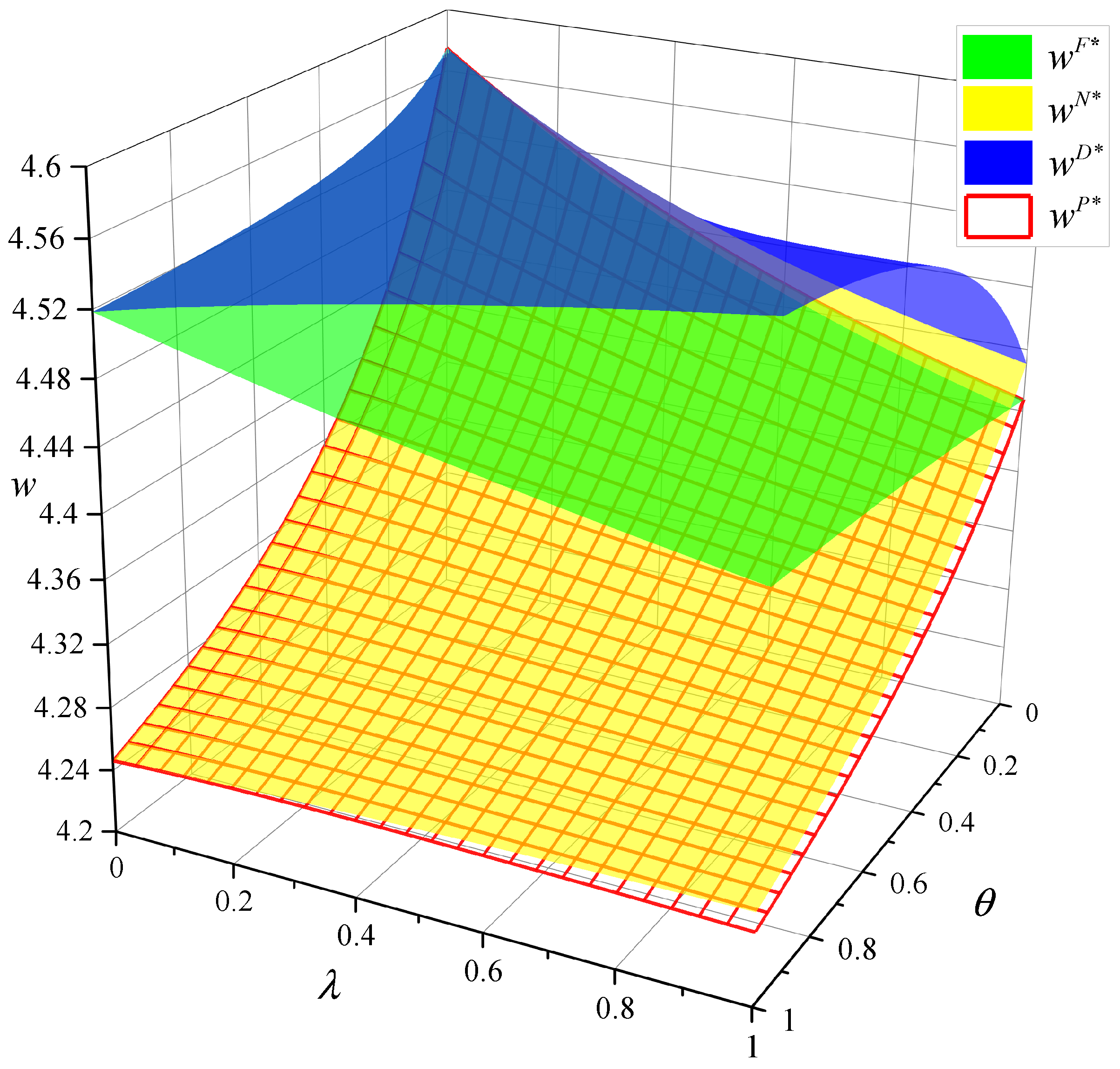
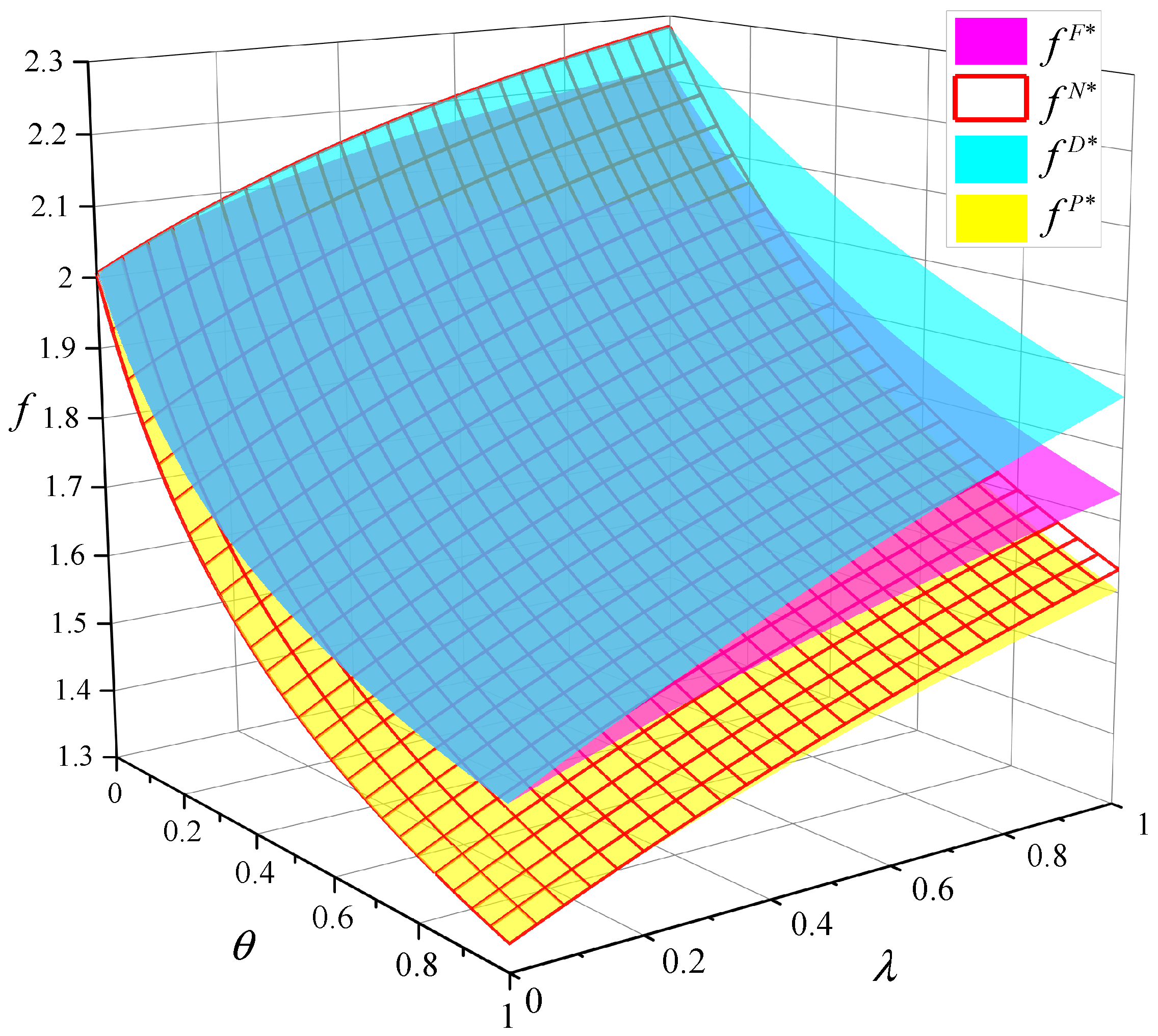

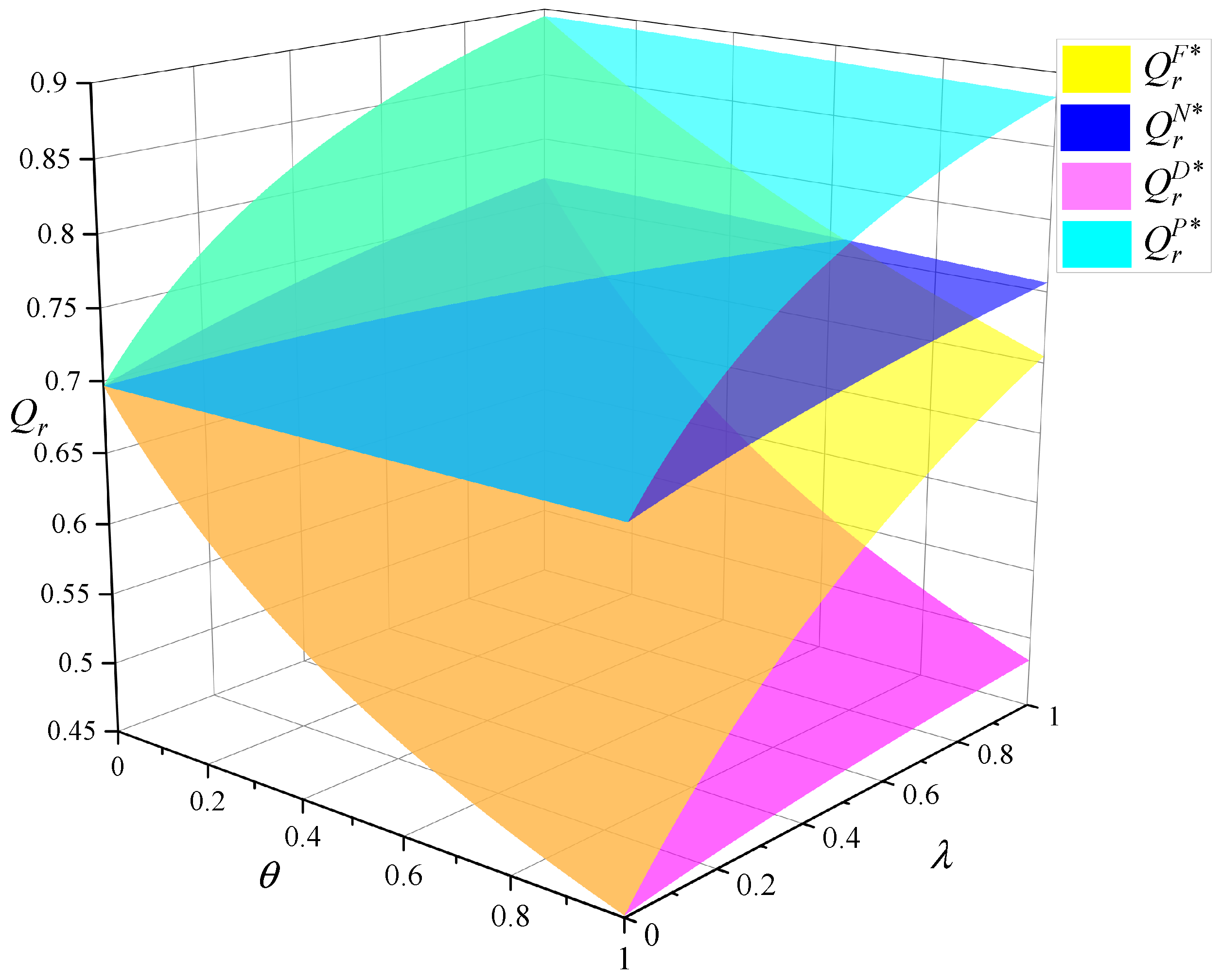
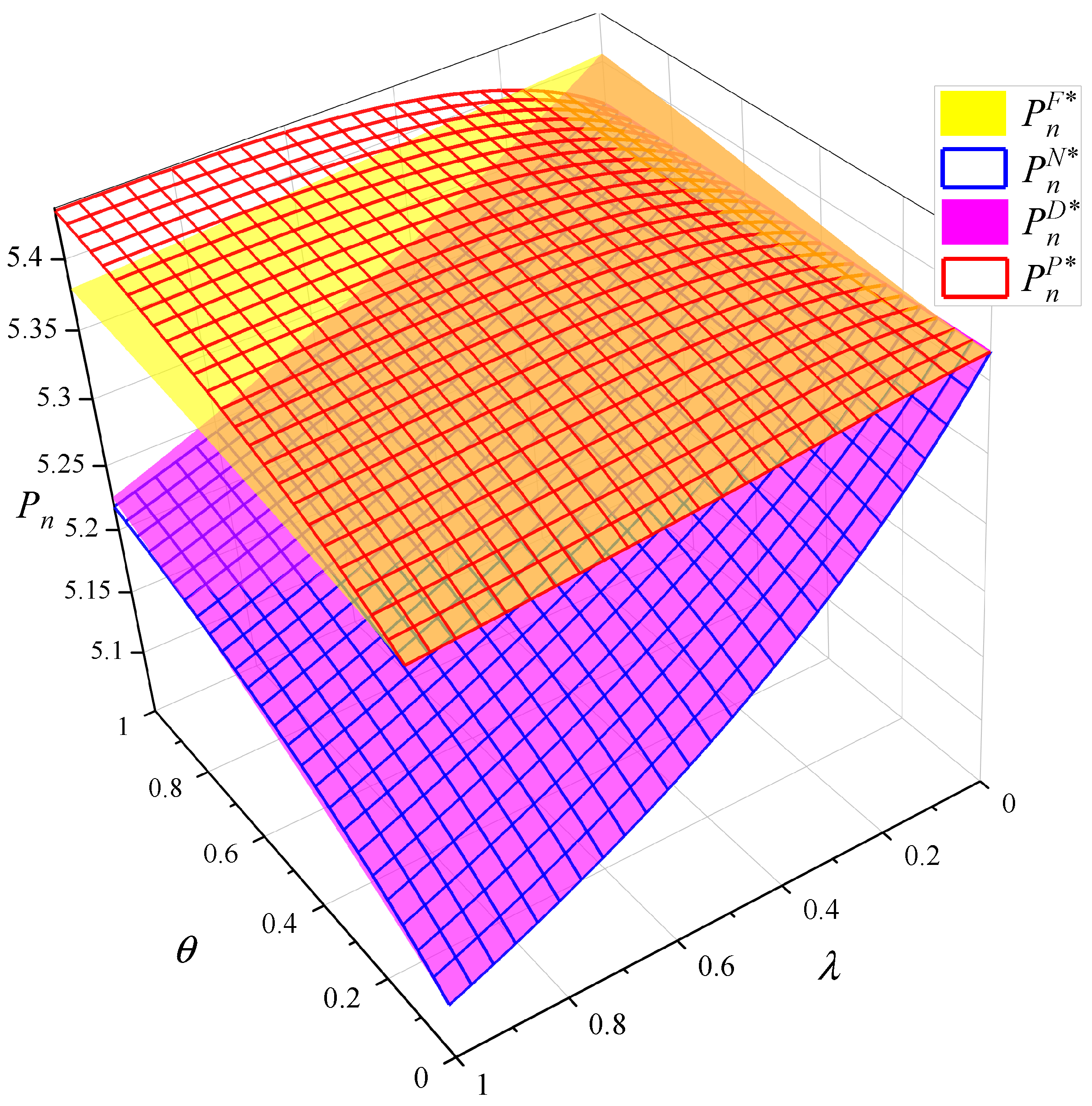
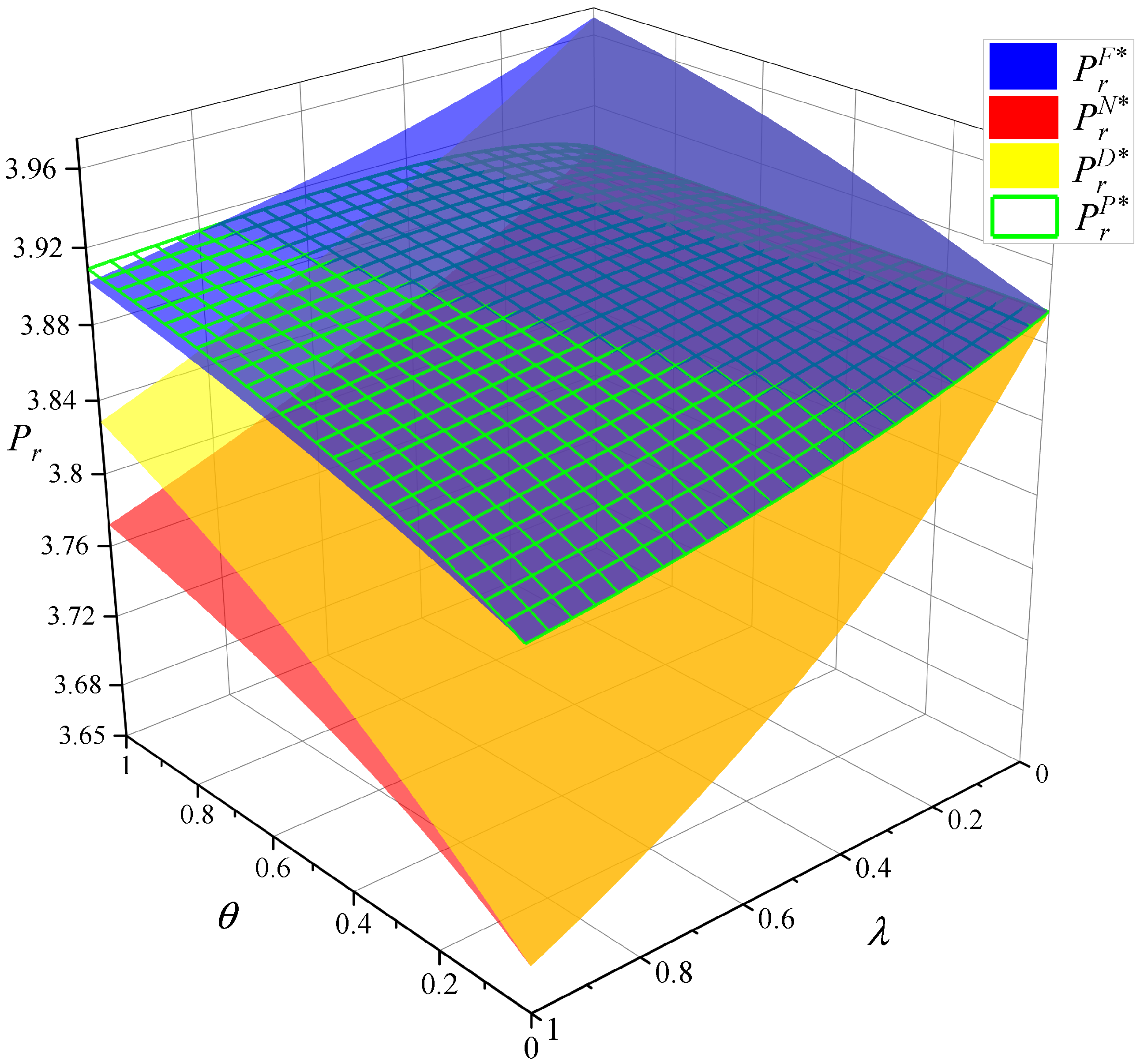
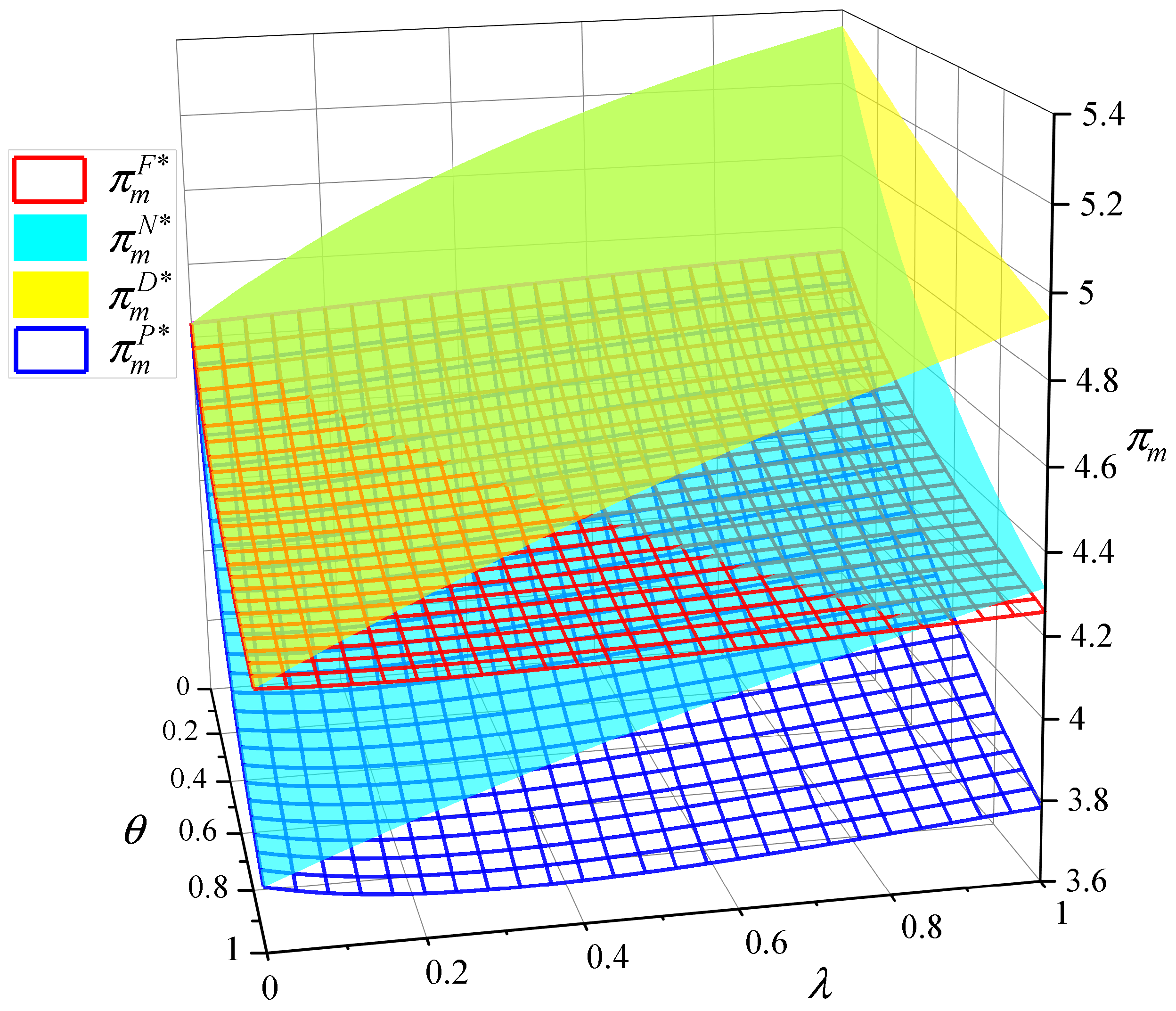
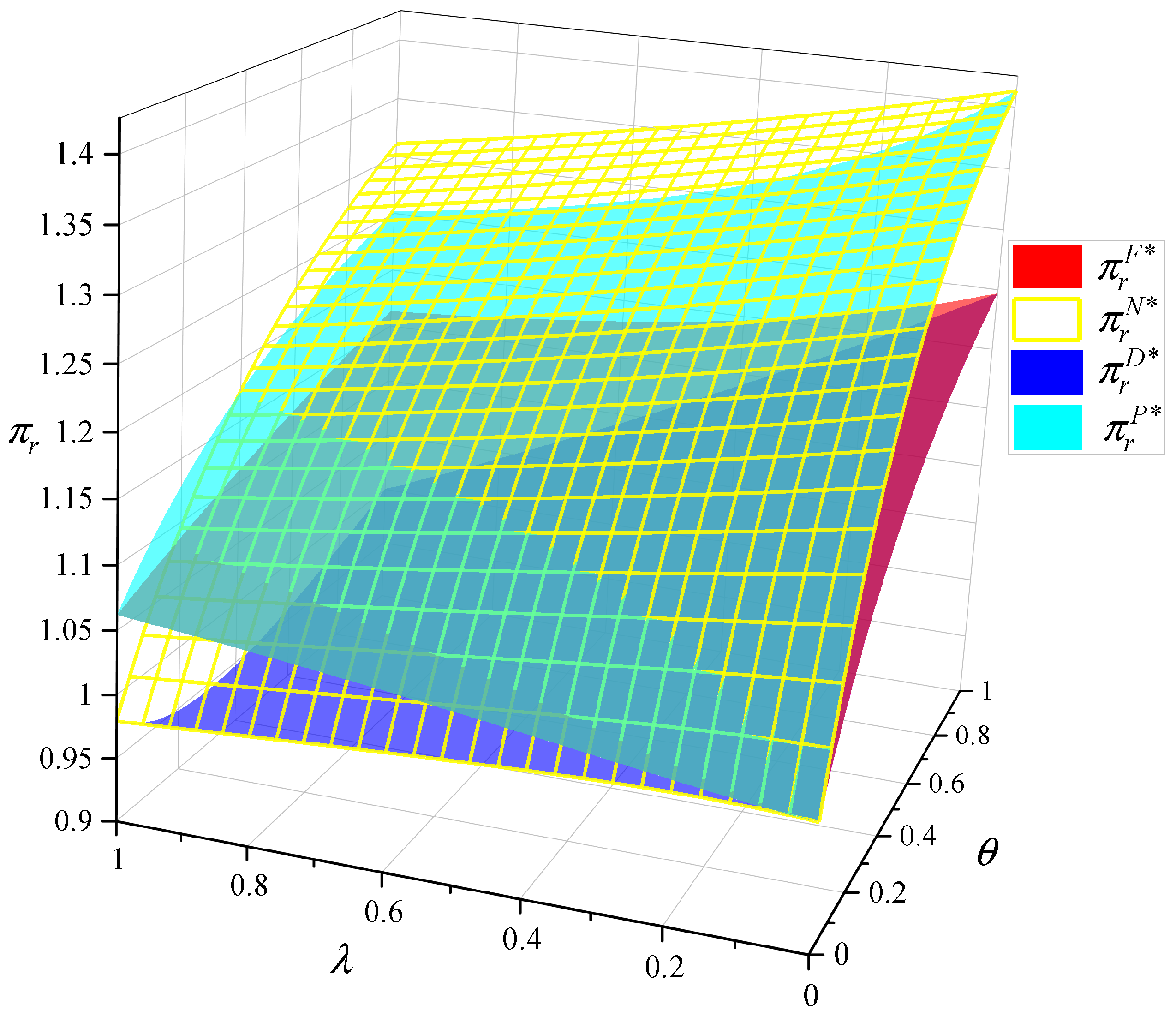
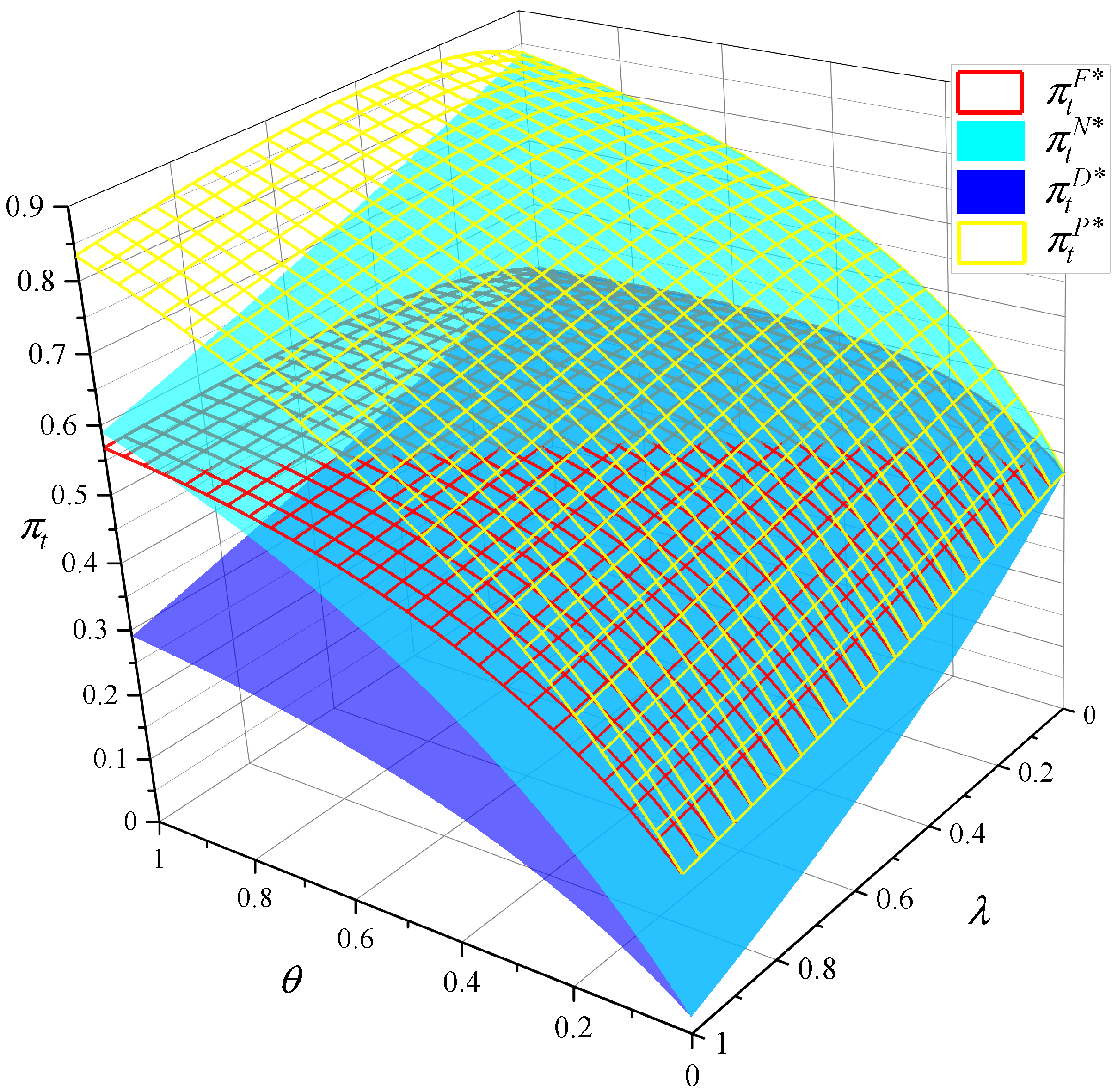
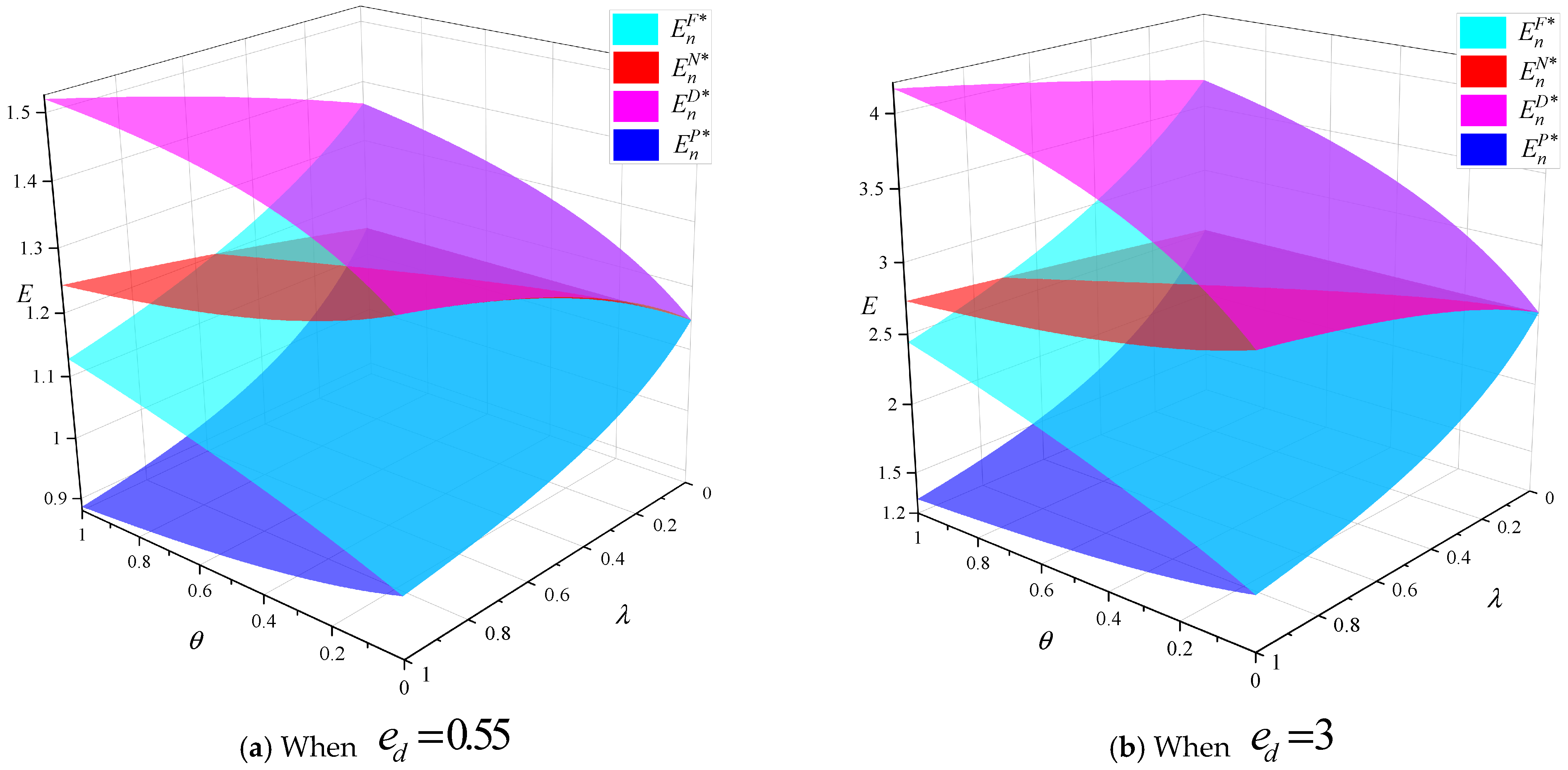
| Symbols | Description |
|---|---|
| Wholesale price of new products (decision variable) | |
| Unit authorization fee (decision variable) | |
| Quantity of new products (decision variable) | |
| Quantity of remanufactured products (decision variable) | |
| Price of new product | |
| Price of remanufactured product | |
| Unit cost of new product | |
| Unit cost of remanufactured product | |
| Market capacity | |
| Consumer WTP for the new product | |
| Consumer acceptance of the remanufactured product | |
| Scaling parameter of collection cost | |
| Coefficient of distributional fairness concerns | |
| Coefficient of peer-induced fairness concerns | |
| Environmental impact per unit of new and remanufactured products during production, respectively | |
| Environmental impact of unit product uncollected by third party | |
| The total environmental impact | |
| , m is the manufacturer, r is the retailer, t is the third party | |
| The utility of the third-party |
Disclaimer/Publisher’s Note: The statements, opinions and data contained in all publications are solely those of the individual author(s) and contributor(s) and not of MDPI and/or the editor(s). MDPI and/or the editor(s) disclaim responsibility for any injury to people or property resulting from any ideas, methods, instructions or products referred to in the content. |
© 2024 by the authors. Licensee MDPI, Basel, Switzerland. This article is an open access article distributed under the terms and conditions of the Creative Commons Attribution (CC BY) license (https://creativecommons.org/licenses/by/4.0/).
Share and Cite
Deng, Z.; Shaharudin, M.R.; Shariff, S.S.R.; Tseng, M.-L. Optimal Decisions in an Authorized Remanufacturing Closed-Loop Supply Chain under Dual-Fairness Concerns. Sustainability 2024, 16, 7609. https://doi.org/10.3390/su16177609
Deng Z, Shaharudin MR, Shariff SSR, Tseng M-L. Optimal Decisions in an Authorized Remanufacturing Closed-Loop Supply Chain under Dual-Fairness Concerns. Sustainability. 2024; 16(17):7609. https://doi.org/10.3390/su16177609
Chicago/Turabian StyleDeng, Zichun, Mohd Rizaimy Shaharudin, S. Sarifah Radiah Shariff, and Ming-Lang Tseng. 2024. "Optimal Decisions in an Authorized Remanufacturing Closed-Loop Supply Chain under Dual-Fairness Concerns" Sustainability 16, no. 17: 7609. https://doi.org/10.3390/su16177609
APA StyleDeng, Z., Shaharudin, M. R., Shariff, S. S. R., & Tseng, M.-L. (2024). Optimal Decisions in an Authorized Remanufacturing Closed-Loop Supply Chain under Dual-Fairness Concerns. Sustainability, 16(17), 7609. https://doi.org/10.3390/su16177609






